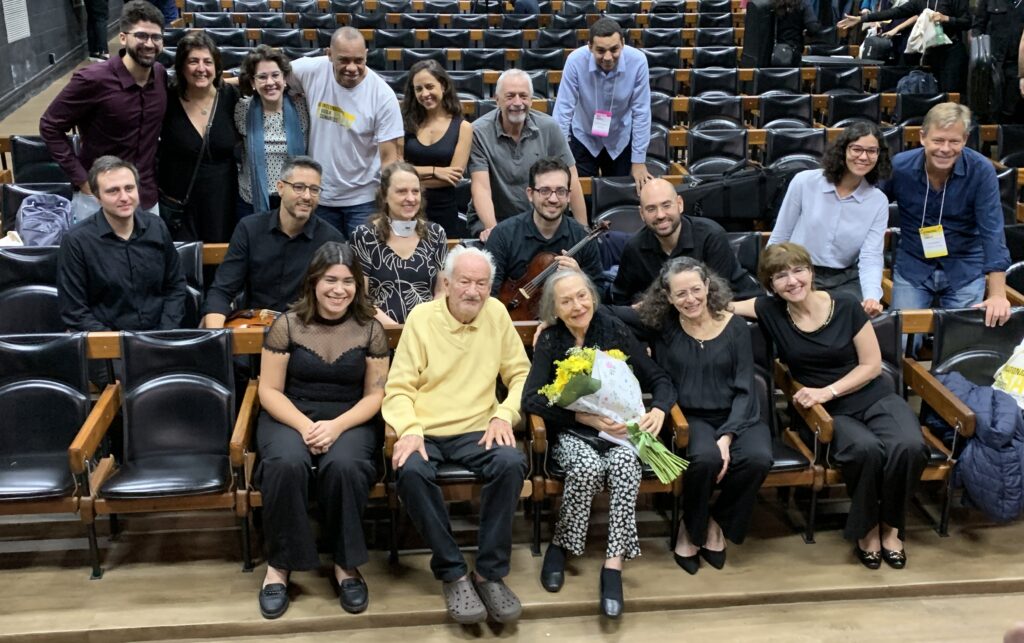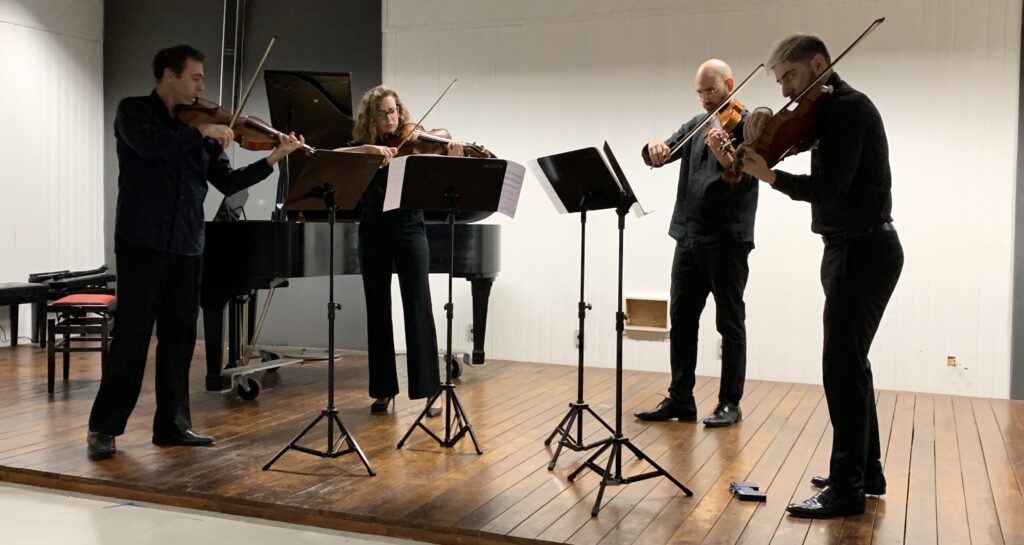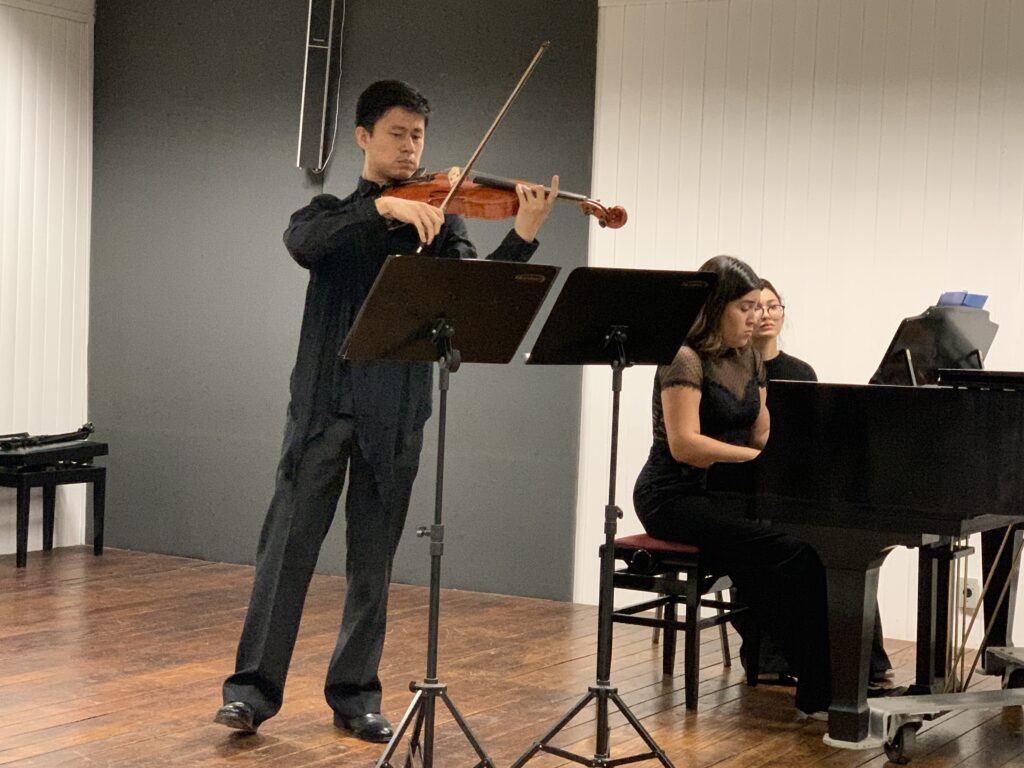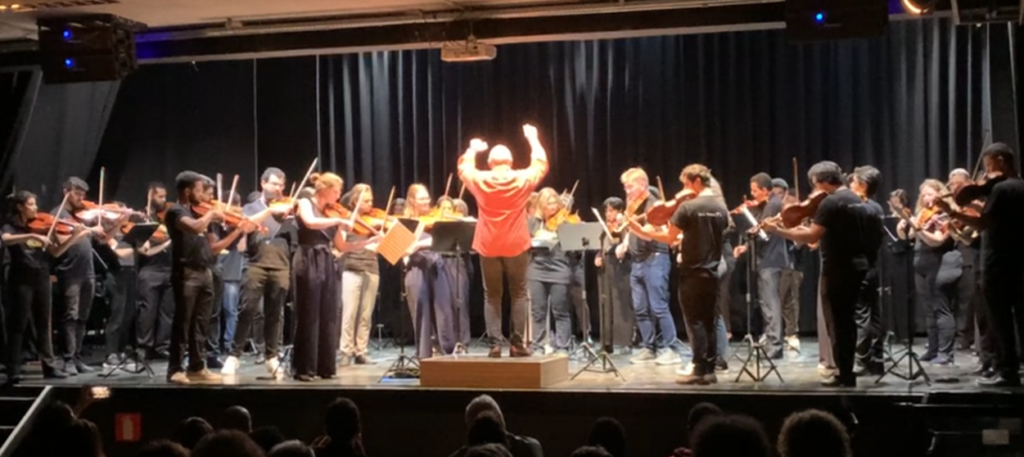The 49th International Viola Congress takes place from 17-21 July in Campinas, Brazil. Your intrepid DVS bloggers bring you the daily debrief from the pulsating heart of the viola world.
Day 5 – Sunday, July 21st 2024
After 4 full days of intensive viola programming, you might think there’s a risk of running out of steam. But while some of us – speaking for myself, at least – have indeed drifted into the red zone in terms of figurative “battery charge level”, the 49th IVC Organization team had clearly saved some of the best parts of the programme for last.
The last congress day started out with a big tribute manifestation for the 95-year-old German-Brazilian composer Ernst Mahle. He has had a significant influence on Brazilian music, composing pedagogical pieces and learning books for all kinds of instruments. He’s still actively composing today. He was flown in for this concert and was showered in extensive speeches and performances of his works for viola, of which there are quite a few (we already heard his Concertino for Viola on Thursday night with Renato Bandel!). I particularly liked the Duetos Modais (performed by Eric Licciardi and Pedro Visockas), acting as a showcase for different modal scales (pentatonic, mixolydian etc). The Quartet for Violas (2021, a world premiere performance) had my mouth watering in anticipation of a hearty main course, but it surprisingly wrapped up after only about 2 minutes. The actual Viola Concerto (C228, 2015), performed by Marco Catto, in the end provided a fitting anchoring point.
Due to the long Mahle programme (almost 2 hours), I had to miss Karin Dolman’s “Puss in Boots: A Lecture Recital on new approaches for successful concert venues“, but fortunately I had heard the dress rehearsal in Dordrecht 2 weeks ago.
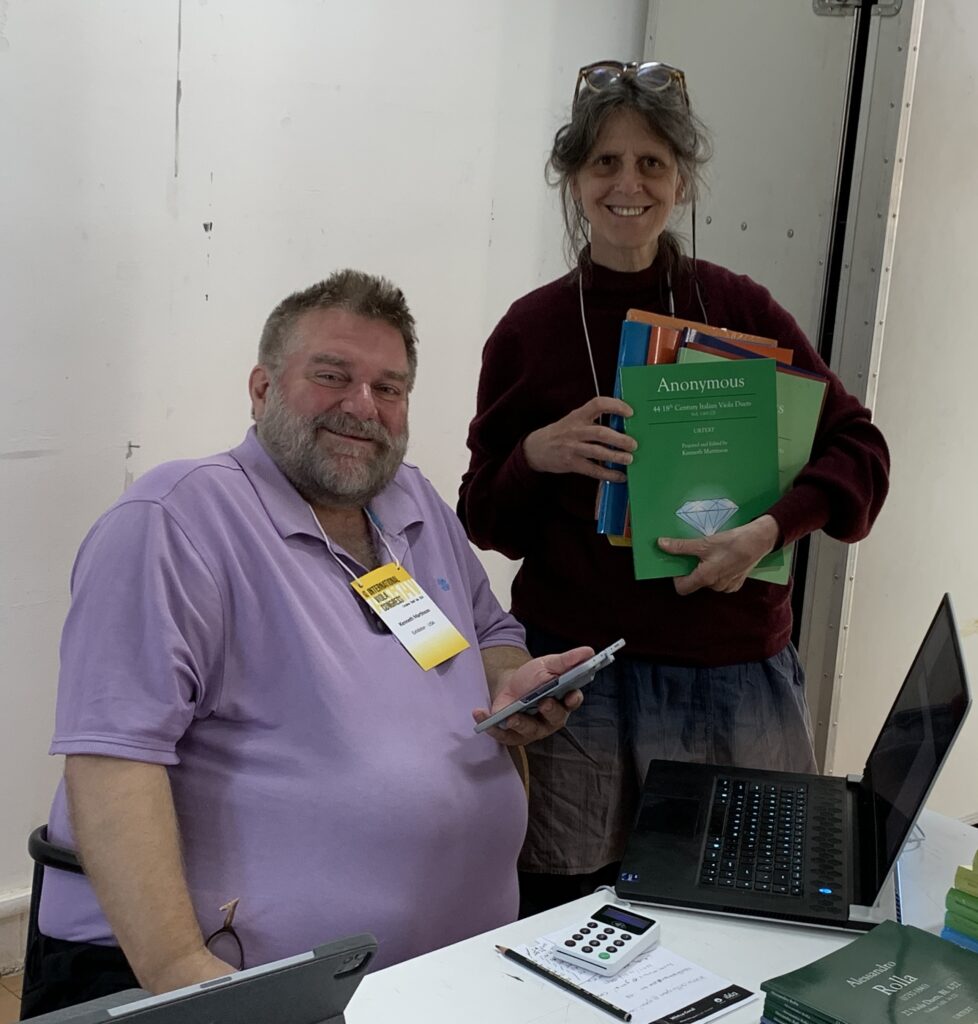 Next it was time for the yearly shopping spree at Ken Martinson’s (Gems Publishing) table. He always makes sure to have some novelties to present at a congress. This year’s catch included two Sinfonia Concertantes by Karl Stamitz, both discussed at Ken’s lecture on Friday afternoon (which I could not attend). Furthermore we bought viola duet books by Félix-Jean Prot, Mathieu Blasius, Leopold Jansa, and “44 18th Century Italian Viola Duets” (in 2 volumes) by “various” anonymous composers.
Next it was time for the yearly shopping spree at Ken Martinson’s (Gems Publishing) table. He always makes sure to have some novelties to present at a congress. This year’s catch included two Sinfonia Concertantes by Karl Stamitz, both discussed at Ken’s lecture on Friday afternoon (which I could not attend). Furthermore we bought viola duet books by Félix-Jean Prot, Mathieu Blasius, Leopold Jansa, and “44 18th Century Italian Viola Duets” (in 2 volumes) by “various” anonymous composers.
As mentioned above, a certain fatigue had started to creep into my head, so I allowed myself a late but generous lunch break to catch up on note-taking (and update my viola ensemble music catalogue!) before rejoining the congress programme later in the afternoon.
The Quarteto Ensaio de Naipe is a Viola Quartet from the São Paulo Symphony Orchestra: Lianna Dugan, Eric Licciardi, Bruno de Luna and Pedro Visockas. They kicked off with a Scherzo Pastorale by Leonardo Martinelli (a São Paulo based composer), in fact nothing less than a brand new set of La Folia variations – sure, why not! They’re interesting listening and even more interesting to play, by the looks of it.
The transcriptions of a Piazzolla tango and the Choro standard “Feira de Mangaio” (hey, there it is again!) were very decent, but more interest went out to the two World Premiere performances on the programme: Firstly “A Viagem” by Nayara Tamarozi (1991), inspired by the memory of passing carnival rhythms (Maracatu again).
Secondly the work “A Mariposa” (The Moth) by Carlos Moreno, dedicated to the memory of Ricardo Kubala. In this piece, undulating arpeggios emulate wings, with long waves of dynamics and delightful shifts in the sound tapestry, eventually morphing into a melody. Big bravo’s resounded in the audience for this piece (and I joined in)!
Symbolically starting the transition to next year’s congress in China, the last recital on the regular congress roster was brought by Yue Qi with the title “Emoting through the Landscape: A Lecture Recital of Five Chinese Viola Compositions“. These new-romantic pieces by leading Chinese composers are often inspired by poetry, which prof. Qi heroically tried to translate for us, with variable success. The piece “Thunderstorm” by Juan Zhou was based on incidental music to the play of the same name; according to Qi a cornerstone of Chinese realistic drama (written in 1925). In terms of musical language it was the most “modernistic” of the set, and by far the most dramatic. The pieces were all very well played (with good backing by pianist Jennifer Alexandra), but I may need to do some cultural stretching to grasp the deeper layers of this music. A nice challenge for the coming 12 months until we head for Xi’an!
The Final Evening Concert was a two-part deal: The IVC Viola Orchestra (in which I took part) played first – as Former IVS president Carlos Maria Solare conducted two movements of the Suite for 8 Violas by Gordon Jacob. As a tribute to the next IVC hosts, we also played the Chinese traditional “Jasmin Flower“. The big showpiece (which had also captured most of our rehearsal time) was however “Festa para Donatella“, composed and conducted by Newton Carreiro. And Yes, without false modesty, the Viola Sisters Ursula and Sunniva shone in their solo parts, using a pair of borrowed “sister” violas kindly provided by our host Emerson. The audience clearly appreciated this piece of swinging Brazilian rhythms (and yes, these themes are still dancing around in my head as I write this, 3 days later).
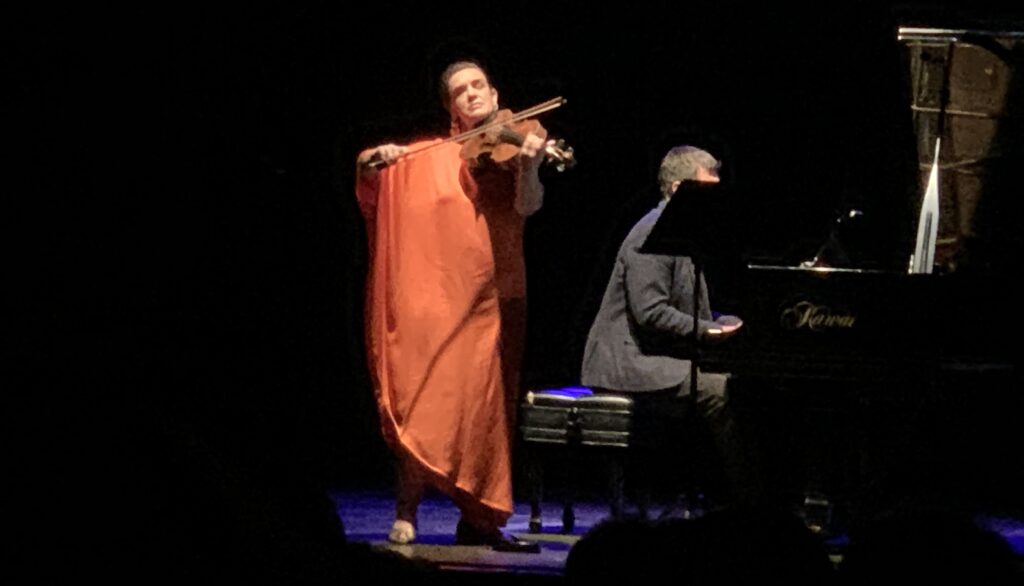 The orchestra cleared the stage and then, suddenly, there she was – Jennifer Stumm, IVC featured artist and passionate viola advocate – but sadly only able to join us for this one evening. Her brilliant orange tunic made every bow stroke a feast of wavy motions. At the piano she was accompanied by the great André Mehmari. Under the programme title “Flow, my Tears“, together they blazed new trails in Dowland, Kurtág, Schubert and various Brazilian classics (yes, more choro!). Britten’s masterpiece “Lachrymae” op.48 (variations on Dowland songs) was in my ears the climax of the concert.
The orchestra cleared the stage and then, suddenly, there she was – Jennifer Stumm, IVC featured artist and passionate viola advocate – but sadly only able to join us for this one evening. Her brilliant orange tunic made every bow stroke a feast of wavy motions. At the piano she was accompanied by the great André Mehmari. Under the programme title “Flow, my Tears“, together they blazed new trails in Dowland, Kurtág, Schubert and various Brazilian classics (yes, more choro!). Britten’s masterpiece “Lachrymae” op.48 (variations on Dowland songs) was in my ears the climax of the concert.
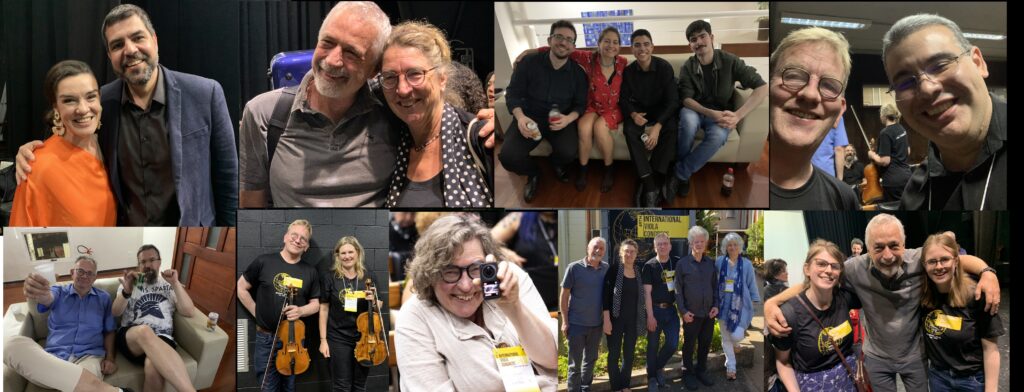 Obviously, the evening did not end with this concert. There was a long afterparty at the hotel, where notes were compared and joint plans drafted for next year’s congress. Well, that too, but mostly just enjoying snacks and drinks in each other’s company. This year’s congress has been a great success both programmatically and socially – the atmosphere was always relaxed and friendly. Infinite thanks – muito obrigado!!! – to our host Emerson de Biaggi and his ABRAV team, they have set a great example.
Obviously, the evening did not end with this concert. There was a long afterparty at the hotel, where notes were compared and joint plans drafted for next year’s congress. Well, that too, but mostly just enjoying snacks and drinks in each other’s company. This year’s congress has been a great success both programmatically and socially – the atmosphere was always relaxed and friendly. Infinite thanks – muito obrigado!!! – to our host Emerson de Biaggi and his ABRAV team, they have set a great example.
See you all in Xi’an next year!
Kristofer Skaug, DVS

